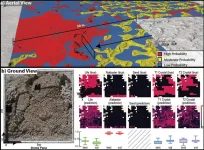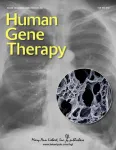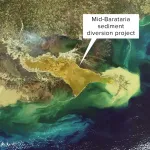(Press-News.org) New research pinpoints a key cause of metastasis from an aggressive form of brain cancer in children and provides a potential new therapy for treating these tumors in the future.
In a paper, published in Nature Cell Biology, physician-scientists from the University of Pittsburgh and UPMC Children’s Hospital of Pittsburgh discovered that medulloblastomas hijack a skill that normal brain cells use during their early development and then manipulate it to help tumors spread.
“Children with medulloblastomas that have not yet metastasized may have a high likelihood of long-term survival, but if those tumors have spread, the survival rate is significantly reduced,” said senior author Baoli Hu, Ph.D., assistant professor of neurological surgery at Pitt. “Longstanding challenges that we face in the field include understanding how tumors are able to spread and how we can stop tumor metastasis.”
Brain tumors are the leading cause of cancer death in children. The most common malignant children’s brain tumor is medulloblastoma, which form in a region of the brain called the cerebellum, with about 500 new cases diagnosed in the U.S. each year. Medulloblastomas are commonly treated with surgery followed by radiation and chemotherapy, but in up to one-third of children, the tumor will metastasize, or spread out to tissues and organs beyond where the tumor originated. When tumor cells spread, treatments no longer work and the outcomes are grim.
To learn how medulloblastoma cells metastasize, Hu and his team leveraged patient and experimental mouse data. They found that levels of a gene called SMARCD3 were significantly higher in metastatic tumors compared to those that had not spread.
They also showed that SMARCD3 hijacks neurodevelopmental signaling pathways to promote tumor cell spreading. These pathways are used by healthy brain cells during early cerebellar development and are shut off when the cerebellum matures.
Next, the researchers targeted these pathways with a drug called dasatinib, which has been approved to treat leukemia in the clinic. In a mouse model of medullobastoma, dasatinib preferentially killed metastatic tumors with higher levels of SMARCD3, suggesting that the drug causes little or no harm to normal brain cells and could be safe for treating patients with medulloblastoma metastasis.
“We’ve been thinking of medulloblastoma metastasis from the perspective of neuroscience and understanding how abnormal brain development causes and influences brain tumors,” said Hu. “This approach helped us to pinpoint fundamental mechanisms of medulloblastoma metastasis, which will help us develop safe, effective and personalized treatments for children with this devastating brain cancer.”
Additional authors of this research include first author Han Zou, a University of Pittsburgh-affiliated visiting research scholar; Bradley Poore, Emily E. Brown, Jieqi Qian, Evridiki Asimakidou, Vladislav Razskazovskiy, Deanna Ayrapetian, Vaibhav Sharma, Apeng Chen, Yongchang Guan, Zhengwei Li, Wendy Fellows-Mayle, Dandan Sun, Beth E. Stronach, Sameer Agnihotri, Gary Kohanbash, Songjian Lu, Karl Herrup, Jeremy N. Rich, George K. Gittes, Alberto Broniscer, Ian F. Pollack, Robert M. Friedlander, and Sarah J. Hainer, all of Pitt; Bin Xie, Shunjin Xia, Fei Liu, Siyi Wanggou, Zhongliang Hu, and Xuejun Li, all of Central South University China; Olivier Saulnier, Michelle Ly, and Michael D. Taylor, all of The Hospital for Sick Children; Guifa Xi and Tadanori Tomita, both of Northwestern University Feinberg School of Medicine; Adam C. Resnick, of Children’s Hospital of Philadelphia; Stephen C. Mack of St Jude Children’s Research Hospital; Eric H. Raabe and Charles G. Eberhart, both of Johns Hopkins University School of Medicine.
This research was supported by the National Institutes of Health (NIH/NINDS 1R21NS125218 and NIGMS R35GM133732), the Matthew Larson Foundation, the Connor’s Cure Fund from the V Foundation and the Andrew McDonough B+ Foundation.
##
END
New study uncovers key culprit behind pediatric brain cancer metastasis
2023-03-06
ELSE PRESS RELEASES FROM THIS DATE:
Can artificial intelligence help find life on Mars or icy worlds?
2023-03-06
March 6, 2023, Mountain View, CA – Wouldn’t finding life on other worlds be easier if we knew exactly where to look? Researchers have limited opportunities to collect samples on Mars or elsewhere or access remote sensing instruments when hunting for life beyond Earth. In a paper published in Nature Astronomy, an interdisciplinary study led by SETI Institute Senior Research Scientist Kim Warren-Rhodes, mapped the sparse life hidden away in salt domes, rocks and crystals at Salar de Pajonales at the boundary of the Chilean Atacama Desert and Altiplano. Then they trained a machine learning model to recognize the patterns and rules associated with their distributions ...
Geosciences at the Crossroads of America
2023-03-06
Boulder, Colo., USA: Oklahoma State University is hosting the 57th annual meeting of the Geological Society of America’s South-Central Section on 13–14 March. The meeting will have a diverse program of workshops, technical sessions, short courses, and field trips that covers a spectrum of geologic disciplines.
The list below highlights a selection of environmental-related session topics you might like:
· Tar Creek Superfund Site Field Trip (Field Trip)
Managed Aquifer Recharge in the Arbuckle Simpson Aquifer (Field Trip)
Geoscience Career Workshop: Career Planning and Networking
· Hydrogeologic Challenges and Roles ...
Gene and cell therapies to combat pancreatic cancer
2023-03-06
Pancreatic cancer is an incurable form of cancer, and gene therapies are currently in clinical testing to treat this deadly disease. A comprehensive review of the gene and cell biotherapies in development to combat pancreatic cancer is published in the peer-reviewed journal Human Gene Therapy. Click here to read the article now
The article titled “Pancreatic Cancer Cell and Gene Biotherapies: Past, Present and Future,” contributed by corresponding author Pierre Cordelier, from the University of Toulouse, and coauthors, ...
Oncotarget | HALP score: Prognostic ability in cancers - a literature review
2023-03-06
“In the last several years, the Hemoglobin, Albumin, Lymphocyte, Platelet Score (HALP) has emerged in the literature as a new prognostic biomarker [...]”
BUFFALO, NY- March 6, 2023 – A new review paper was published in Oncotarget's Volume 14 on February 25, 2023, entitled, “What is hemoglobin, albumin, lymphocyte, platelet (HALP) score? A comprehensive literature review of HALP’s prognostic ability in different cancer types.”
Since its inception, the Hemoglobin, Albumin, Lymphocyte, Platelet (HALP) Score has gained attention as a new prognostic biomarker to predict several clinical outcomes in a multitude ...
Nationwide study finds that women have greater risk of mortality than men after coronary artery bypass surgery
2023-03-06
Compared with men, women continue to have a roughly 30-40 percent higher risk of dying following coronary artery bypass surgery, according to a large study led by investigators at Weill Cornell Medicine and NewYork-Presbyterian/Weill Cornell Medical Center. The analysis showed that, without adjusting for differences in age and other health factors that influence risk, the female bypass patients had a 2.8 percent rate of death during or soon after surgery, compared with 1.7 percent for male patients, a nearly 50 percent difference that only dropped 10-20 percent after accounting for these factors.
The study, which appears Mar. 1 in JAMA Surgery, was based on ...
Assessing the risk of excess folic acid intake
2023-03-06
It is well established that folic acid supplementation can significantly reduce the risk of birth defects, including neural tube defects like spina bifida, the most common birth defect of the central nervous system and the second most common of all structural birth defects. More than 80 nations, including the U.S. 25 years ago, have established mandated folic acid food fortification programs, which have been successful.
“However, there is a lack of research on whether excessive folic acid intake has the potential ...
Geisinger study supports genetic testing for people with cerebral palsy
2023-03-06
DANVILLE, Pa. – A Geisinger meta-analysis of recent research on the genetics of cerebral palsy (CP) provides evidence that genetic testing should be offered as the standard of care for people with the disorder, similar to current recommendations for individuals with other neurodevelopmental disorders (NDD). The findings were published Tuesday in JAMA Pediatrics.
Individual cases of CP—a condition that affects movement, balance and posture—have often been attributed to birth asphyxia, although recent studies show that asphyxia accounts for less than 10% of cases. A growing body of evidence suggests that a significant proportion of CP is caused by genetic changes, ...
New Geology articles published online ahead of print
2023-03-06
Boulder, Colo., USA: Article topics and locations include the Red Lake greenstone belt, Canada; Anak Krakatau volcano, Indonesia; martian soil; Glacial Lake Missoula, Montana, USA; and findings from IODP Expedition 385. These Geology articles are online at https://geology.geoscienceworld.org/content/early/recent .
Crustal conductivity footprint of the orogenic gold district in the Red Lake greenstone belt, western Superior craton, Canada
Ademola Q. Adetunji; Gaetan Launay; Ian J. Ferguson; Jack M. Simmons; Chong Ma ...
A magnetotelluric (MT) study across the Red Lake greenstone belt of the ...
Mississippi River Delta study reveals which human actions contribute to land loss
2023-03-06
BLOOMINGTON, Ind. — Research from scientists at Indiana University and Louisiana State University reveals new information about the role humans have played in large-scale land loss in the Mississippi River Delta — crucial information in determining solutions to the crisis.
Published in Nature Sustainability, the study compares the impacts of different human actions on land loss and explains historical trends. Until now, scientists have been unsure about which human-related factors are the most consequential, and why ...
High-dose anticoagulation can reduce intubations and improve survival for hospitalized COVID-19 patients
2023-03-06
High-dose anticoagulation can reduce deaths by 30 percent and intubations by 25 percent in hospitalized COVID-19 patients who are not critically ill when compared to the standard treatment, which is low-dose anticoagulation. These are the significant findings from the large-scale international “FREEDOM” trial, led by Valentin Fuster, MD, PhD, President of Mount Sinai Heart and Physician-in-Chief of The Mount Sinai Hospital, and General Director of the Spanish National Center for Cardiovascular Research (CNIC).
The study results were announced Monday, March 6, ...







